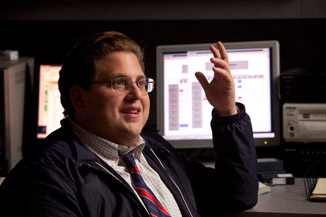|
|
BOP Interview: Jonah HillBy Ryan MazieSeptember 21, 2011
Your character in Moneyball uses a formula to combat the “face for baseball” popularity contest the sport was becoming. Do you think Hollywood has the same problem, where people only see the surface value? Jonah Hill: I don’t want to name people that aren’t as good looking as other people, but at the end of the day, unfortunately, it is all based on ticket sales. The studios base their decisions on who can get people to come – and that’s it. Amy Pascal, who runs Sony, and the people at Sony are really special in that way. They really, really care about their movies, making films like The Social Network and Moneyball and Girl with the Dragon Tattoo, which aren’t getting made at other places. They are making cool adult tentpole dramas, if you will, and it is very fking unique and cool. … They make Spider-Man, which will make a ton of money, so they have that luxury, but they care. At the end of the day, any studio head will tell you that they look at a receipt to see how much money you are worth. So did you see Moneyball to be a comparison to Hollywood as well? JH: Of course there is a massive comparison with Hollywood and Moneyball. That’s how I saw it. I familiarized myself with the inner workings of baseball and really studied, but the way I saw the character was that this is how my friends and I talk about other actors, directors, and writers. We sit and we analyze them and break them down – here are their weaknesses, here are their strengths. And that’s what [they do in baseball]. But unfortunately, it is just a number.
|

|
|
|

|
Friday, November 1, 2024
© 2024 Box Office Prophets, a division of One Of Us, Inc.


